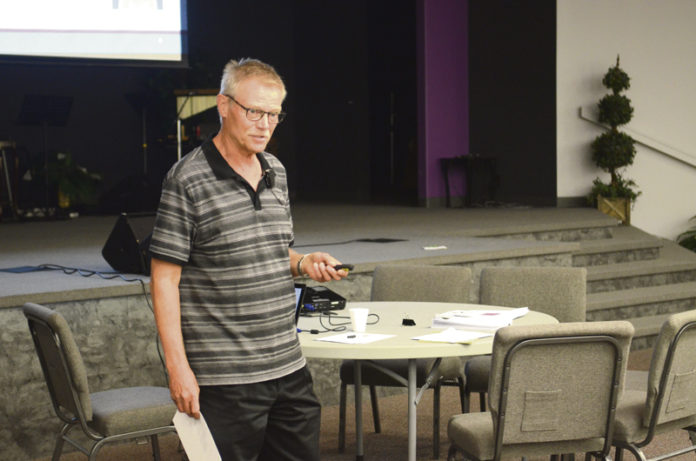
The Saskatchewan Seniors Mechanism (SSM) wants seniors to take control of their own destiny and have their voice heard as the population of older adults over the age of 55 continues to grow.
The SSM was in Prince Albert Thursday to host a public engagement session as it works to develop a seniors strategy for Saskatchewan. The event was hosted with the Prince Albert Seniors Advocacy Centre (PASAC), and older adults between the ages of 69 and 91 attended to express their concerns and present their ideas on how to move forward on improving the quality of life for older adults.
The session was facilitated by Randy Dove, the incoming president of the SSM. It’s one of many sessions that will be held across the province in the coming months ahead of the planned release of the strategy in spring 2019.
“We’re trying to build a foundation to lead to a strategy,” Dove said Thursday.
“We want to talk about where do we go from here.”
That means not dwelling on prior political news such as the shutdown of STC, instead coming up with solutions that can be applied either locally or on a province-wide basis. Dove said government supports for seniors are far behind those in other provinces, as Saskatchewan only has a single consultant in the Ministry of Health. Other provinces have seniors strategies, ministers and departments, things this province lacks.
Dove said the SSM has found that concerns typically fall into one of six categories: Health care, housing, services, transportation, finances and meaningful participation in society
“We don’t think that (single consultant) adequately deals with (these issues),” Dove said. With adults over the age of 55 making up 27 per cent of the population of the province today, and a projected 34 per cent by 2038, these are important topics to talk about.
‘The concerns people are talking about today will only multiply,” Dove said.
He also emphasized that while people may think of seniors as being a drain on health and housing, and soon to die, more and more are living independently and life expectancies are always increasing.
“What truth seems to be showing is that people are living independently much longer,” he said. ‘There’s a not a dementia tsunami coming.”
While cases of older people needed additional care do exist, it’s not the majority.
The challenge then, Dove said, is to determine what can be done beyond just asking for more money.
“Our challenge is to ask what we can do about these things,” he said.
“The point is not to go to government and say ‘take care of us.’ Funding is going to be an issue no matter how this pans out, because there is only so much. People don’t want to pay more taxes. Just to say we can redirect money from this to that sounds good, but it’s not that easy to achieve. There has to be some self-reliance.”
Dove then turned to those in attendance and challenged them to come up with some ideas and some concerns that impact them. That feedback will be incorporated into the provincial strategy.
Several of the topics — such as the rising costs of care, challenges of getting to medical appointment and questions about where to turn for support — are not unique to Prince Albert.
“Issues are not community or geographically centred,” Dove said.
“They are quite universal across the province. We haven’t been all over yet, but so far, what we’re hearing is pretty consistent.”
While the ideas are widespread, the solutions often have to be more locally focused.
“Part of the commentary here today was how important it is to act locally,” Dove said.
“People need to act locally, they need to plan. I heard a lot of people say here today, we understand what our need is. What we need is a vehicle to do something with them. The value of the day was to recognize their neighbour has a similar set of issues, but also that there are some opportunities to do something.”
Dove hopes the strategy will provide some form of a vehicle for seniors of the province to have their voices heard.
“We hope it gets government, particularly government, to understand the issues affecting this segment of the population, and we hope and believe that in creating that understanding we can achieve some greater action than has been the case in some time.”.
For those in attendance, ensuring their voice was heard is an important part of the process.
“I still need to know that people in authority are calling on seniors and letting them know what we think, because we know what we need and what we think,” said Eleanor George, one of the people in attendance. She agreed the same issues come up over and over.
“We have to speak up for ourselves,” she said. “We have to tell people in charge what we want, not them telling us what they want us to have. They don’t know. I’m able to speak my mind, and everybody else here is too.”
Now, the ideas and thoughts generated today will go back to the SSM. They’ll take those ideas and group them into a survey and send them back. Those surveys and this feedback will go into a report with findings, which will become the strategy. Dove said they plan to present that as widely as they can.
“The goal is to build momentum beyond just talk,” he said.
George is hopeful the strategy will be effective.
“I think they’re sincerely trying to make things better for us,” she said.

